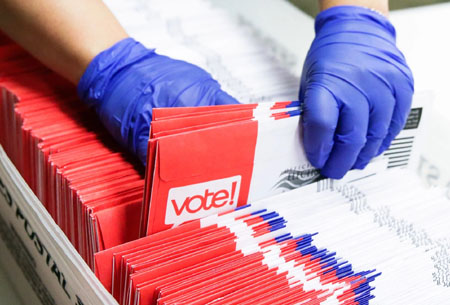by WorldTribune Staff / 247 Real News November 10, 2025
The Supreme Court on Monday agreed to hear a case which addresses whether states can count mail-in ballots that are received after Election Day.
 The Republican National Committee and Mississippi Libertarian Party challenged Mississippi’s law which allows the counting of ballots postmarked by Election Day if they arrive within five days.
The Republican National Committee and Mississippi Libertarian Party challenged Mississippi’s law which allows the counting of ballots postmarked by Election Day if they arrive within five days.
Judicial Watch initially filed the civil rights lawsuit in February 2024 on behalf of the Libertarian Party of Mississippi, challenging the election law. The suit was consolidated with one filed by the Republican National Committee, the Mississippi Republican Party, and other complainants.
The court agreed to hear the matter after the 5th Circuit Court of Appeals struck down the law in 2024.
“The Supreme Court now has an opportunity to reaffirm that ‘Election Day’ means what it says under federal law,” said Judicial Watch President Tom Fitton. “Counting ballots received after Election Day not only violates federal law but encourages voter fraud and undermines voter confidence. The Supreme Court should uphold the historic decision by the Fifth Circuit that sensibly concluded that counting ballots received after Election Day is unlawful.”
President Donald Trump has maintained that late-arriving ballots and drawn-out electoral counts undermine confidence in elections. In March, the Republican president signed an executive order on elections that aims to require votes to be “cast and received” by Election Day. The order has been challenged in court.
Mississippi is among 18 states and the District of Columbia that accept mail-in ballots received after Election Day as long as the ballots are postmarked on or before that date, according to the National Conference of State Legislatures.
The list includes swing states such as Nevada and states such as Colorado, Oregon, and Utah that rely heavily on mail voting.
In the Mississippi case, Judge Andrew Oldham wrote for the appellate panel that Congress established a “singular” Election Day for members of Congress and presidential electors, “by which ballots must be both cast by voters and received by state officials.” Judges James Ho and Stuart Kyle Duncan joined Oldham’s opinion invalidating the Mississippi law.
Some Republican-led states, including Kansas and North Dakota, have taken steps to stop counting late-arriving ballots. In Ohio, Republican lawmakers are advancing legislation that would require ballots to be received by Election Day, closing the window for mailed ballots. The measure has passed the state Senate.
The Supreme Court is separately considering reviving a lawsuit filed by Judicial Watch on behalf of Illinois state Rep. Mike Bost and backed by the Trump Administration that challenges Illinois’ ballot receipt law. The issue is whether the congressman has the legal right to sue.
